新大学日语四级考试样题
- 格式:doc
- 大小:505.03 KB
- 文档页数:36
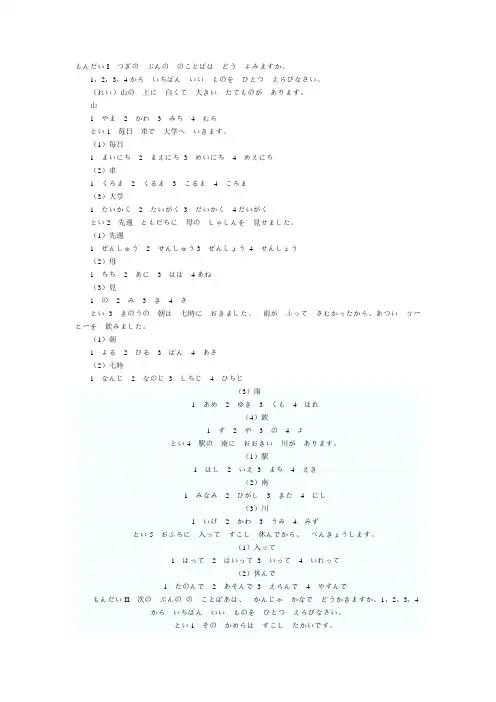
もんだいIつぎのぶんののことばはどうよみますか。
1,2,3,4からいちばんいいものをひとつえらびなさい。
(れい)山の上に白くて大きいたてものがあります。
山1やま2かわ3みち4むらとい1毎日車で大学へいきます。
(1)毎日1まいにち2まえにち3めいにち4めえにち(2)車1くろま2くるま3こるま4ころま(3)大学1たいかく2たいがく3だいかく4だいがくとい2先週ともだちに母のしゃしんを見せました。
(1)先週1ぜんしゅう2せんしゅう3ぜんしょう4せんしょう(2)母1ちち2あに3はは4あね(3)見1の2み3き4さとい3きのうの朝は七時におきました。
雨がふってさむかったから、あついコーヒーを飲みました。
(1)朝1よる2ひる3ばん4あさ(2)七時1なんじ2なのじ3しちじ4ひちじ来源:考试大-小语种考试(3)雨1あめ2ゆき3くも4はれ(4)飲1す2や3の4よとい4駅の南におおきい川があります。
(1)駅1はし2いえ3まち4えき(2)南1みなみ2ひがし3きた4にし(3)川1いけ2かわ3うみ4みずとい5おふろに入ってすこし休んでから、べんきょうします。
(1)入って1はって2はいって3いって4いれって(2)休んで1たのんで2あそんで3えらんで4やすんでもんだいII次のぶんののことばあは、かんじゃかなでどうかきますか。
1,2,3,4からいちばんいいものをひとつえらびなさい。
とい1そのかめらはすこしたかいです。
(1)すこし1示し2小い3少し4不し(2)たかい1長い2高い3多い4安いとい2ドアのみぎにでんきにすいっちがあります。
(1)みぎ1右2石3後4戸(2)でんき1電気2天気3電器4電機(3)すいっち1スイッテ2ネイッテ3スイッチ4ヌイッチとい3いつもここでしんぶんをかいます。
(1)しんぶん1新文2新分3新聞4新本(2)か1員2貿3貸4買とい4らいげつのむいかにともだちがきます。
来源:考试大-小语种考试责编:xyq 评论纠错(1)むいか1 八日2九日3三日4六日(2)き1来2木3気4行もんだいIII次のぶんの()のところになにをいれますか。

日语专四模拟试题及答案一、听力理解(共20分)1. 根据所听对话,选择正确答案。
- 问题:对话中提到的天气如何?A. 晴朗B. 多云C. 下雨答案:C2. 根据所听短文,回答以下问题。
- 问题:短文中提到的主人公去了哪里?答案:主人公去了图书馆。
二、词汇与语法(共30分)1. 选择填空。
- 例句:昨日はとても______でした。
A. 忙しいB. 忙しかったC. 忙しくて答案:B2. 将下列句子翻译成日语。
- 例句:明天是周末,我们可以去公园。
答案:明日は週末ですから、私たちは公園へ行けます。
三、阅读理解(共20分)1. 阅读以下短文,选择正确答案。
- 问题:短文中提到的活动是什么?A. 看电影B. 参加派对C. 去旅行答案:B2. 根据短文内容,回答问题。
- 问题:短文中的人物关系是什么?答案:他们是朋友。
四、完形填空(共15分)1. 阅读下面的短文,从括号内选择适当的选项填入空白处。
- 例句:彼は()に急に病気になりました。
A. 学校B. 家C. 仕事答案:B五、翻译(共15分)1. 将下列句子从日语翻译成中文。
- 例句:彼は新しい車を買いました。
答案:他买了一辆新车。
六、写作(共20分)1. 根据以下提示写一篇短文。
- 提示:描述你的一天。
- 答案:(考生需根据提示自行撰写短文)注:本试题及答案仅供参考,实际考试内容可能有所不同。
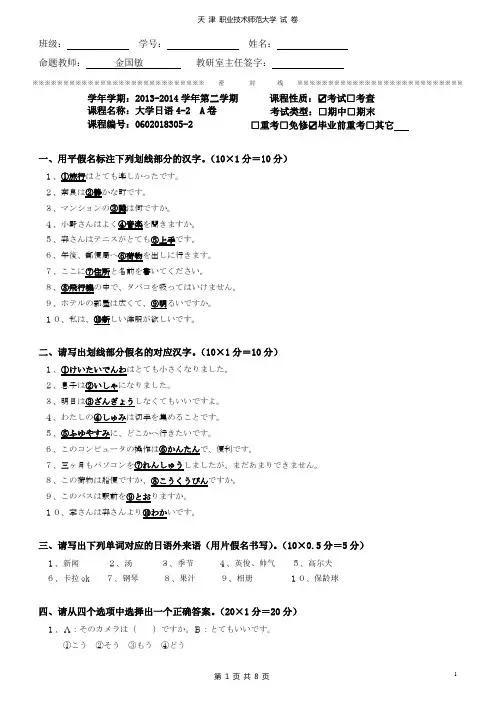
※※※※※※※※※※※※※※※※※※※※※※※※※※※※密封线※※※※※※※※※※※※※※※※※※※※※※※※※※※※※学年学期:2013-2014学年第二学期课程性质:☑考试□考查课程名称:大学日语4-2 A卷考试类型:□期中□期末课程编号:0602018305-2 □重考□免修☑毕业前重考□其它一、用平假名标注下列划线部分的汉字。
(10×1分=10分)1、①旅行はとても楽しかったです。
2、奈良は②静かな町です。
3、マンションの③隣は何ですか。
4、小野さんはよく④音楽を聞きますか。
5、森さんはテニスがとても⑤上手です。
6、午後、郵便局へ⑥荷物を出しに行きます。
7、ここに⑦住所と名前を書いてください。
8、⑧飛行機の中で、タバコを吸ってはいけません。
9、ホテルの部屋は広くて、⑨明るいですか。
10、私は、⑩新しい洋服が欲しいです。
二、请写出划线部分假名的对应汉字。
(10×1分=10分)1、①けいたいでんわはとても小さくなりました。
2、息子は②いしゃになりました。
3、明日は③ざんぎょうしなくてもいいですよ。
4、わたしの④しゅみは切手を集めることです。
5、⑤ふゆやすみに、どこかへ行きたいです。
6、このコンピュータの操作は⑥かんたんで、便利です。
7、三ヶ月もパソコンを⑦れんしゅうしましたが、まだあまりできません。
8、この荷物は船便ですか、⑧こうくうびんですか。
9、このバスは駅前を⑨とおりますか。
10、李さんは森さんより⑩わかいです。
三、请写出下列单词对应的日语外来语(用片假名书写)。
(10×0.5分=5分)1、新闻2、汤3、季节4、英俊、帅气5、高尔夫6、卡拉ok 7、钢琴8、果汁9、相册10、保龄球四、请从四个选项中选择出一个正确答案。
(20×1分=20分)1、A:そのカメラは()ですか。
B:とてもいいです。
①こう②そう③もう④どう2、A:このテレビは()ですね。
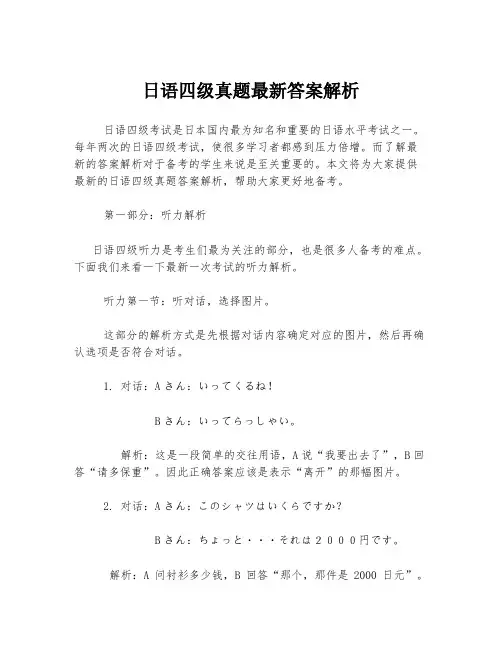
日语四级真题最新答案解析日语四级考试是日本国内最为知名和重要的日语水平考试之一。
每年两次的日语四级考试,使很多学习者都感到压力倍增。
而了解最新的答案解析对于备考的学生来说是至关重要的。
本文将为大家提供最新的日语四级真题答案解析,帮助大家更好地备考。
第一部分:听力解析日语四级听力是考生们最为关注的部分,也是很多人备考的难点。
下面我们来看一下最新一次考试的听力解析。
听力第一节:听对话,选择图片。
这部分的解析方式是先根据对话内容确定对应的图片,然后再确认选项是否符合对话。
1. 对话:Aさん:いってくるね!Bさん:いってらっしゃい。
解析:这是一段简单的交往用语,A说“我要出去了”,B回答“请多保重”。
因此正确答案应该是表示“离开”的那幅图片。
2. 对话:Aさん:このシャツはいくらですか?Bさん:ちょっと・・・それは2000円です。
解析:A问衬衫多少钱,B回答“那个,那件是2000日元”。
根据答语,应该选出表示“价格”的图片。
听力第二节:对话问答这部分的解析方式是根据问题和回答的内容,选择正确的选项。
3. 问题::いつもお母さんが朝ご飯を準備してくれますか?正确答案:Bさん:いいえ、自分で用意します。
解析:问题询问的是“你的妈妈一直给你做早饭吗?”B回答“不,我自己准备早饭。
”因此正确答案应该是表示个人做“饭”的选项。
4. 问题:子供のころ好きだった遊びは何ですか?正确答案:Aさん:アウトドアスポーツが好きでした。
解析:问题问的是“你小时候喜欢的游戏是什么?”A回答“我喜欢户外运动。
”因此正确答案应该是表示“户外运动”的选项。
第二部分:阅读解析日语四级阅读部分也是考试的一个重要组成部分。
下面我们来看一下最新一次考试的阅读解析。
阅读第一节:选择填空这部分的解析方式是根据文章内容和问题要求,选择正确的答案。
5. 文章:旅行会社が毎年発表している「世界のベスト10ビーチ」に、日本のビーチもランキングされている。
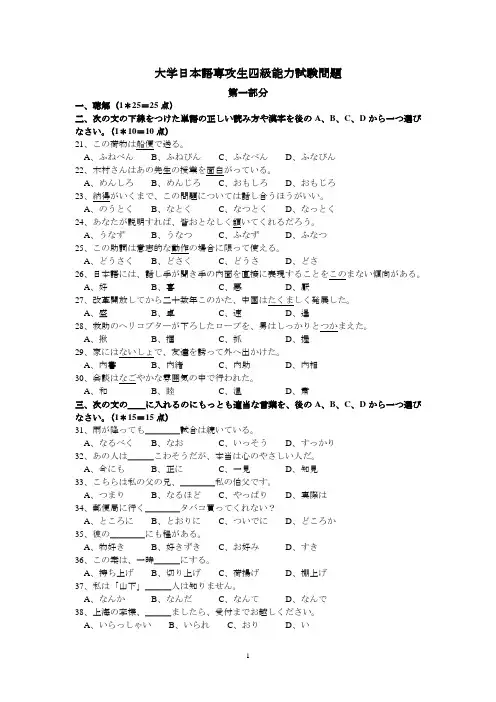
大学日本語専攻生四級能力試験問題第一部分一、聴解(1*25=25点)二、次の文の下線をつけた単語の正しい読み方や漢字を後のA、B、C、Dから一つ選びなさい。
(1*10=10点)21、この荷物は船便で送る。
A、ふねべんB、ふねびんC、ふなべんD、ふなびん22、木村さんはあの先生の授業を面白がっている。
A、めんしろB、めんじろC、おもしろD、おもじろ23、納得がいくまで、この問題については話し合うほうがいい。
A、のうとくB、なとくC、なつとくD、なっとく24、あなたが説明すれば、皆おとなしく頷いてくれるだろう。
A、うなずB、うなつC、ふなずD、ふなつ25、この助詞は意志的な動作の場合に限って使える。
A、どうさくB、どさくC、どうさD、どさ26、日本語には、話し手が聞き手の内面を直接に表現することをこのまない傾向がある。
A、好B、喜C、悪D、厭27、改革開放してから二十数年このかた、中国はたくましく発展した。
A、盛B、卓C、速D、逞28、救助のヘリコプターが下ろしたロープを、男はしっかりとつかまえた。
A、揪B、掴C、抓D、握29、家にはないしょで、友達を誘って外へ出かけた。
A、内書B、内緒C、内助D、内相30、会談はなごやかな雰囲気の中で行われた。
A、和B、睦C、温D、粛三、次の文の__に入れるのにもっとも適当な言葉を、後のA、B、C、Dから一つ選びなさい。
(1*15=15点)31、雨が降っても____試合は続いている。
A、なるべくB、なおC、いっそうD、すっかり32、あの人は___こわそうだが、本当は心のやさしい人だ。
A、今にもB、正にC、一見D、知見33、こちらは私の父の兄、____私の伯父です。
A、つまりB、なるほどC、やっぱりD、実際は34、郵便局に行く____タバコ買ってくれない?A、ところにB、とおりにC、ついでにD、どころか35、彼の____にも程がある。
A、物好きB、好きずきC、お好みD、すき36、この案は、一時___にする。
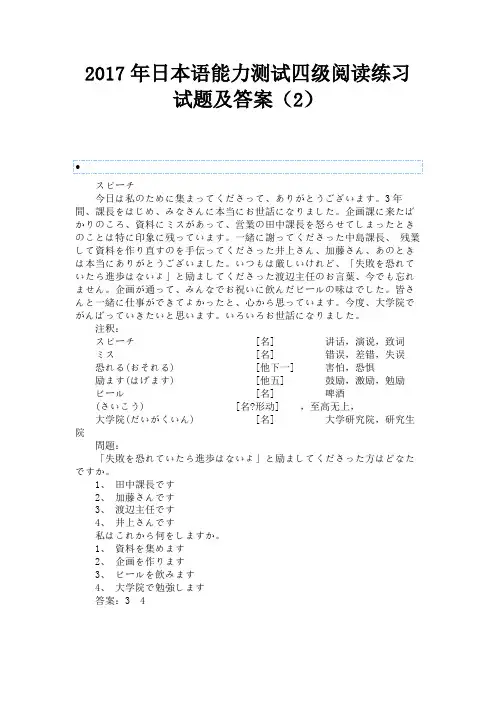
2017年日本语能力测试四级阅读练习
试题及答案(2)
•
スピーチ
今日は私のために集まってくださって、ありがとうございます。
3年間、課長をはじめ、みなさんに本当にお世話になりました。
企画課に来たばかりのころ、資料にミスがあって、営業の田中課長を怒らせてしまったときのことは特に印象に残っています。
一緒に謝ってくださった中島課長、残業して資料を作り直すのを手伝ってくださった井上さん、加藤さん、あのときは本当にありがとうございました。
いつもは厳しいけれど、「失敗を恐れていたら進歩はないよ」と励ましてくださった渡辺主任のお言葉、今でも忘れません。
企画が通って、みんなでお祝いに飲んだビールの味はでした。
皆さんと一緒に仕事ができてよかったと、心から思っています。
今度、大学院でがんばっていきたいと思います。
いろいろお世話になりました。
注釈:
スピーチ[名] 讲话,演说,致词
ミス[名] 错误,差错,失误
恐れる(おそれる) [他下一] 害怕,恐惧
励ます(はげます) [他五] 鼓励,激励,勉励
ビール[名] 啤酒
(さいこう) [名?形动] ,至高无上,
大学院(だいがくいん) [名] 大学研究院,研究生院
問題:
「失敗を恐れていたら進歩はないよ」と励ましてくださった方はどなたですか。
1、田中課長です
2、加藤さんです
3、渡辺主任です
4、井上さんです
私はこれから何をしますか。
1、資料を集めます
2、企画を作ります
3、ビールを飲みます
4、大学院で勉強します
答案:3 4。
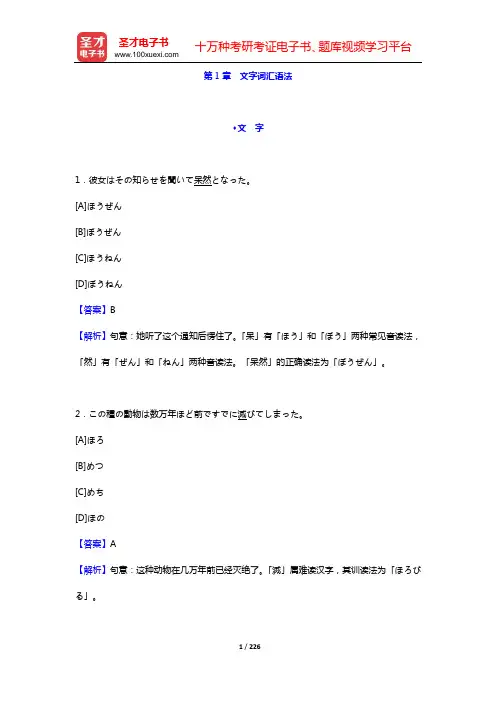
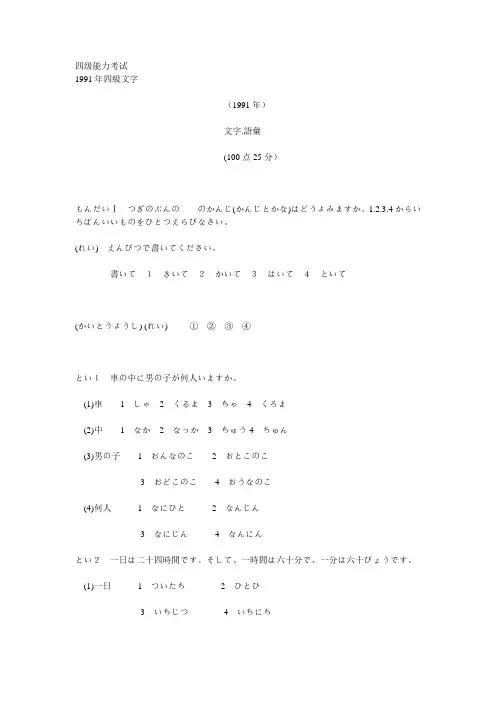
四级能力考试1991年四級文字(1991年)文字.語彙(100点25分)もんだいⅠつぎのぶんののかんじ(かんじとかな)はどうよみますか。
1.2.3.4からいちばんいいものをひとつえらびなさい。
(れい)えんぴつで書いてください。
書いて1きいて2かいて3はいて4といて(かいとうようし) (れい) ①②③④とい1車の中に男の子が何人いますか。
(1)車1しゃ2くるま3ちゃ4くろま(2)中1なか2なっか3ちゅう4ちゅん(3)男の子1おんなのこ2おとこのこ3おどこのこ4おうなのこ(4)何人1なにひと2なんじん3なにじん4なんにんとい2一日は二十四時間です。
そして、一時間は六十分で、一分は六十びょうです。
(1)一日1ついたち2ひとひ3いちじつ4いちにち(2)二十四時間1にじゅうしじげん2にじゅうよんじけん3にじゅうよじかん4にじゅうしじかん(3)一分1いっぷん2いちふん3いちぶ4いちぶんとい3雨の日は外へ出ないで、家でゆっくり休みます。
(1)雨1かぜ2あめ3ゆき4くも(2)外1そと2はか3どこ4うち(3)出ない1いかない2こない3でない4やらない(4)家1へや2しつ3いえ4みせ(5)休み1のみ2たのみ3すみ4やすみとい4先に食べてください。
わたしは後で食べます。
(1)先に1せんに2つぎに3すぐに4さきに(2)食べて1とべて2のべて3たべて4くべて(3)後で1あとで2にちで3ごで4こうでもんだいⅡつぎのぶんののことばはかんじやかなでどうかきますか。
1.2.3.4からいちばんいいものをひとつえらびなさい(れい)つくえのうえに本があります。
うえ1土2干3上4下(かいとうようし) (れい) ①②③④とい1えきのまえでバスをおります。
そして、みなみのほうへ100メートルぐらいいってください。
ひだりがわにおおきいホテルがあります。
(1)まえ1後2前3先4間(2)みなみ1東2西3南4北(3)いって1言って2走って3入って4行って(4)ひだり1左2在3石4右(5)おおきい1高きい2多きい3広きい4大きいとい2ちちのたんじょうびにねくたいとわいしゃつをあげました。
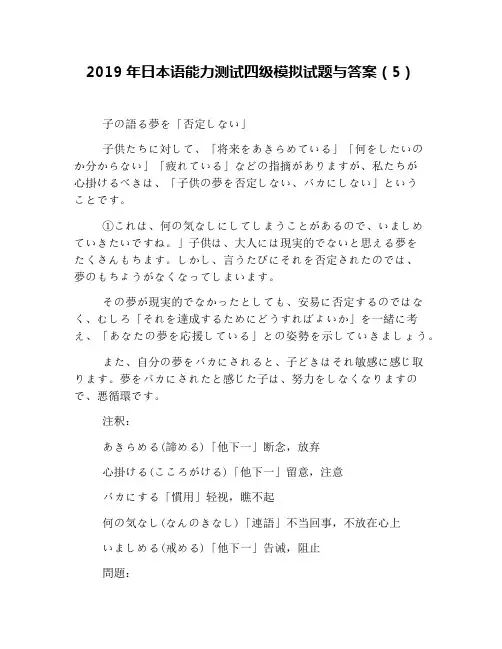
2019年日本语能力测试四级模拟试题与答案(5)子の語る夢を「否定しない」子供たちに対して、「将来をあきらめている」「何をしたいのか分からない」「疲れている」などの指摘がありますが、私たちが心掛けるべきは、「子供の夢を否定しない、バカにしない」ということです。
①これは、何の気なしにしてしまうことがあるので、いましめていきたいですね。
」子供は、大人には現実的でないと思える夢をたくさんもちます。
しかし、言うたびにそれを否定されたのでは、夢のもちようがなくなってしまいます。
その夢が現実的でなかったとしても、安易に否定するのではなく、むしろ「それを達成するためにどうすればよいか」を一緒に考え、「あなたの夢を応援している」との姿勢を示していきましょう。
また、自分の夢をバカにされると、子どきはそれ敏感に感じ取ります。
夢をバカにされたと感じた子は、努力をしなくなりますので、悪循環です。
注釈:あきらめる(諦める)「他下一」断念,放弃心掛ける(こころがける)「他下一」留意,注意バカにする「慣用」轻视,瞧不起何の気なし(なんのきなし)「連語」不当回事,不放在心上いましめる(戒める)「他下一」告诫,阻止問題:①「これは、何の気なしにしてしまうことがあるので、」とありますが、「何の気なしにしてしまうこと」とはどういうことですか。
1、最近の子は夢を持たないと言ってしまうこと。
2、私たちが心掛けるころを忘れてしまうこと。
3、子供の夢を否定すること。
4、子供に何をしたいのかを聞くこと。
子供の夢を否定すると、どのような結果になりますか1、こどもは自分の夢をバカにします。
2、こどもは現実からにげだします。
3、こどもは現実的になります。
4、こどもは努力しなくなります。
大人に戒めてほしいことは何ですか。
1、子どもと同じ夢を持つこと2、子どもと一緒に夢を考えること。
3、子どもの夢をバカにしないこと。
4、子どもの夢を応援しないこと。
答案:3 4 3。
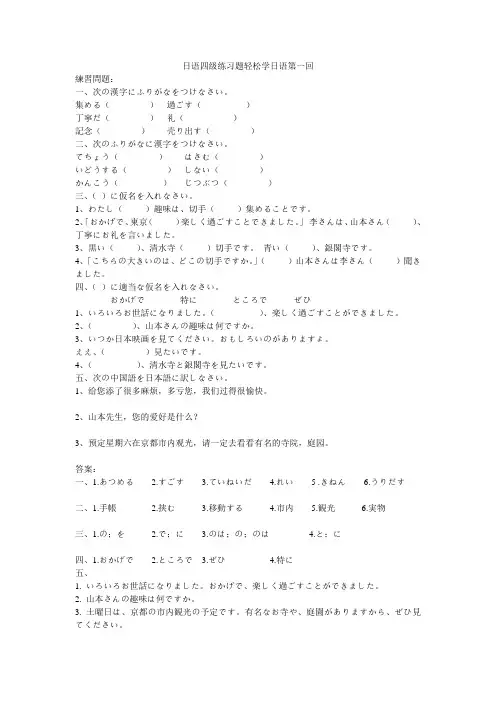
練習問題:一、次の漢字にふりがなをつけなさい。
集める()過ごす()丁寧だ()礼()記念()売り出す()二、次のふりがなに漢字をつけなさい。
てちょう()はさむ()いどうする()しない()かんこう()じつぶつ()三、()に仮名を入れなさい。
1、わたし()趣味は、切手()集めることです。
2、「おかげで、東京()楽しく過ごすことできました。
」李さんは、山本さん()、丁寧にお礼を言いました。
3、黒い()、清水寺()切手です。
青い()、銀閣寺です。
4、「こちらの大きいのは、どこの切手ですか。
」()山本さんは李さん()聞きました。
四、()に適当な仮名を入れなさい。
おかげで特にところでぜひ1、いろいろお世話になりました。
()、楽しく過ごすことができました。
2、()、山本さんの趣味は何ですか。
3、いつか日本映画を見てください。
おもしろいのがありますよ。
ええ、()見たいです。
4、()、清水寺と銀閣寺を見たいです。
五、次の中国語を日本語に訳しなさい。
1、给您添了很多麻烦,多亏您,我们过得很愉快。
2、山本先生,您的爱好是什么?3、预定星期六在京都市内观光,请一定去看看有名的寺院,庭园。
答案:一、1.あつめる 2.すごす 3.ていねいだ 4.れい 5 .きねん 6.うりだす二、1.手帳 2.挟む 3.移動する 4.市内 5.観光 6.実物三、1.の;を 2.で;に 3.のは;の;のは 4.と;に四、1.おかげで 2.ところで 3.ぜひ 4.特に五、1. いろいろお世話になりました。
おかげで、楽しく過ごすことができました。
2. 山本さんの趣味は何ですか。
3. 土曜日は、京都の市内観光の予定です。
有名なお寺や、庭園がありますから、ぜひ見てください。
一、次の漢字にふりがなをつけなさい。
電気()空()曇る()予定()場所()渋滞する()二、次のふりがなに漢字をつけなさい。
まよう()せいのう()あきはばら()ぎんざ()あさくさ()三、()に仮名を入れなさい。
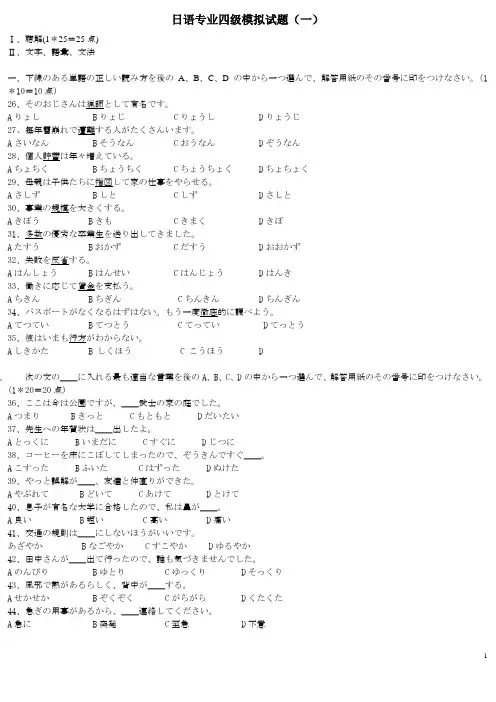
日语专业四级模拟试题(一)Ⅰ、聴解(1*25=25点)Ⅱ、文字、語彙、文法一、下線のある単語の正しい読み方を後のA、B、C、Dの中から一つ選んで、解答用紙のその番号に印をつけなさい。
(1*10=10点)26、そのおじさんは猟師として有名です。
Aりょし BりょじCりょうしDりょうじ27、毎年雪崩れで遭難する人がたくさんいます。
AさいなんBそうなんCおうなん Dぞうなん28、個人貯蓄は年々増えている。
Aちょちく BちょうちくCちょうちょく Dちょちょく29、母親は子供たちに指図して家の仕事をやらせる。
AさしずBしと Cしず Dさしと30、事業の規模を大きくする。
AきぼうBきもCきまくDきぼ31、多数の優秀な卒業生を送り出してきました。
AたすうBおかずCだすうDおおかず32、失敗を反省する。
AはんしょうBはんせいCはんじょうDはんき33、働きに応じて賃金を支払う。
AちきんBちぎんCちんきんDちんぎん34、パスポートがなくなるはずはない。
もう一度徹底的に調べよう。
Aてつてい Bてつとう CてっていDてっとう35、彼はいまも行方がわからない。
Aしきかた B しくほう C こうほう D、次の文の__に入れる最も適当な言葉を後のA、B、C、Dの中から一つ選んで、解答用紙のその番号に印をつけなさい。
(1*20=20点)36、ここは今は公園ですが、__武士の家の庭でした。
Aつまり BきっとCもともとDだいたい37、先生への年賀状は__出したよ。
AとっくにBいまだにCすぐにDじつに38、コーヒーを床にこぼしてしまったので、ぞうきんですぐ__。
AこすったBふいたCはずった Dぬけた39、やっと誤解が__、友達と仲直りができた。
AやぶれてBどいて CあけてDとけて40、息子が有名な大学に合格したので、私は鼻が__。
A良いB短いC高いD痛い41、交通の規則は__にしないほうがいいです。
あざやかBなごやかCすこやかDゆるやか42、田中さんが__出て行ったので、誰も気づきませんでした。
n4jlpt题
N4级日语能力考试(N4 JLPT)是一种评估学习者日语能力的考试。
以下是一些可能出现在N4级日语能力考试中的题目类型示例:
1. 选择正确的假名填空:给出一个日语句子,要求从几个选项中选择正确的假名填入空缺处,以使句子通顺。
2. 选择正确的词语意思:给出一个单词或短语,要求从几个选项中选择与之意思相符的词语。
3. 建议完成对话:给出一个对话的一部分,要求根据上下文从几个选项中选择合适的句子或短语来完成对话。
4. 阅读理解:给出一篇短文,要求回答相关问题,测试对文章内容的理解。
5. 表达意见:要求根据给出的情景和条件,用日语表达自己的意见或建议。
以上只是一些可能的题型示例,实际的N4级日语能力考试可能会包含更多不同类型的题目。
如果您有具体的题目或需要解答关于N4级日语能力考试的问题,请提供更多详细信息,我将尽力帮助您。
大学日語四級考試(試巻一)Ⅰ略Ⅱ文字と語彙セクション(20分間)一、次ののことばの読み方をそれぞれ「A」「B」「C」「D」から1つ選びなさい。
21、6月10日は私の誕生日です。
「A」とおか「B」よっか「C」ここのか「D」ようか22、西の空が赤くなりました。
「A」ひがし「B」にし「C」みなみ「D」きた23、日本のアニメは世界で有名です。
「A」ゆめ「B」ゆめい「C」ゆうめ「D」ゆうめい24、隣の教室は広いです。
「A」ひくい「B」せまい「C」ひろい「D」ふかい25、わたしの専攻は教育学です。
「A」せいこう「B」せんこう「C」せいこん「D」せんこん26、君も来れば 6人になる。
「A」か「B」き「C」く「D」こ27、残暑がまだ厳しい。
「A」きびしい「B」はげしい「C」さびしい「D」くるしい28、鯨は魚の仲間ではない。
「A」ちゅうま「B」なかま「C」ちゅうかん「D」なかかん29、気持ちが落ち着く場所を求めている。
「A」あつめている「B」はじめている「C」もとめている「D」たしかめている30、もうすぐ時間ですよ。
急いでください。
「A」きれいで「B」およいで「C」つないで「D」いそいで二、次ののことばの漢字を、それぞれ「A」「B」「C」「D」から 1つ選びなさい。
31、やまがきれいですね。
「A」山「B」土「C」川「D」畑32、荷物はつくえの横にあります。
「A」棚「B」机「C」車「D」柱33、やすければ買いましょう。
「A」高ければ「B」易しければ「C」低ければ「D」安ければ34、周りの人にめいわくをかけてはいけません。
「A」面倒「B」世話「C」迷惑「D」邪魔35、おやとして子どもに伝えておきたいことがあります。
「A」両親「B」母「C」大人「D」親36、彼のはっぴょうはすばらしかったです。
「A」発表「B」発展「C」発見「D」発明37、2つの単語の意味をくらべてみてください。
「A」調べて「B」並べて「C」述べて「D」比べて38、好きなものをえらんで、とっておいてください。
大学日语四级考试样题试卷一一、将自己的学校名、姓名、准考证号写在答题卡和试卷二上。
考试结束后,将答题卡、试卷一、试卷二放在桌子上,待监考人员收卷后方可离开考场。
答题卡、试卷一、试卷二均不得带走。
二、仔细读懂题目的说明。
三、在120分钟内答完全部试题,不得拖延时间。
四、客观多项选择试题的答案一定要划在答题卡上,主观试题写在试卷二上。
凡写在试卷一上的答案一律作废。
五、客观多项选择试题只能选一个答案,多选作废。
选定答案后,用HB-2B铅笔按规定在相应字母的中部划一条横线。
正确的方法如下:[A][B][C][D]六、如果要改动答案,必须先用橡皮擦去原来选定的答案。
七、主观试题用钢笔或圆珠笔书写。
Ⅰ聴解セクション(听解部分)(20分間)これから聞くテストを行います。
一、写真問題(图片题)写真か絵を見て質問に答えてください。
はじめに写真か絵について質問します。
その後で文を四つ言います。
その四つの中から正しい答えを一つ選んでください。
文は1回しか言いません。
まず例題をしてみましょう。
答えはAです。
このような問題は1から5まであります。
それでは、問題を始めます。
1.2.3.4.5.二、応答問題(应答题)始めに一人が短い文を一つ言う。
その後でもう一人がそれに答える。
正しい答えを[A][B][C][D]から、一つ選んでください。
文は一回しか言いない。
まず例題をしてみよう。
答えはAです。
このような問題は6から10まであります。
それでは、問題を始めます。
6.[A] [B] [C] [D] 7.[A] [B] [C] [D] 8.[A] [B] [C] [D] 9.[A] [B] [C] [D] 10.[A] [B] [C] [D]三、会話問題(对话题)二人の会話を聞いて、質問に答えてください。
質問は会話を聞く前と聞いた後2回言います。
正しい答えを[A][B][C][D]から、一つ選んでください。
会話は一回しか言いません。
まず例題をしてみましょう。
答えはAです。
このような問題は11から20まであります。
それでは、問題を始めます。
11.12.13.[A] 晴れ[B] 曇り[C] 雨[D] 晴れ時々曇り14.[A] 春[B] 夏[C] 秋[D] 冬15.[A] 食べ物[B] 本[C] 花[D] ハンカチ16.[A] アルバイトをしました。
[B] 女の人と映画を見ました。
[C] 友達の誕生パーティーに出ました。
[D] 家で友達の電話を待ちました。
17.[A] 手紙を書きます。
[B] メモをとります。
[C] メールを送ります。
[D] 電話をします。
18.[A] 冷蔵庫[B] 電子レンジ[C] 洗濯機[D] 炊飯器19.[A] コーヒー[B] 紅茶[C] ジュース[D] コーラ20.[A] 病院[B] 喫茶店[C] レストラン[D] スーパーⅠ聴解セクション(1-20题,每题1分,共20分)12345678910ADCACBADAC11 12 13 14 15 16 17 18 19 20BACDACDBDAⅡ文字と語彙セクション(20分間)一、次ののことばの読み方を、それぞれ[A][B][C][D]から一つ選びなさい。
21.日本は中国の東にあります。
[A] ひがし[B] みなみ[C] にし[D] きた22.お父さんは電気をつけて、へやに入りました。
[A] てんき[B] でんき[C] けんき[D] げんき23.この学校には古い建物がたくさんあります。
[A] たかい[B] ひくい[C] とおい[D] ふるい24.お体を大切にしてください。
[A] たいじ[B] だいじ[C] たいせつ[D] だいせつ25.寮の前で待ってください。
[A] たって[B] まって[C] かって[D] うって26.問題が難しくてできませんでした。
[A] むずかしくて[B] あたらしくて[C] すずしくて[D] おかしくて27.明日の9時に研究室に来てください。
[A] いて[B] いって[C] きて[D] きって28.子供の教育に豊かな経験があります。
[A] しずか[B] たしか[C] はるか[D] ゆたか29.机は本棚の横に置きましょう。
[A] あきましょう[B] ひきましょう[C] おきましょう[D] ききましょう30.7月の8日に試験があります。
[A] よっか[B] ようか[C] みっか[D] ここのか二、次ののことばの漢字を、それぞれ[A][B][C][D]から一つ選びなさい。
31.いもうとは大学生です。
[A] 弟[B] 兄[C] 姉[D] 妹32.木の下にいぬがいます。
[A] 猫[B] 犬[C] 鳥[D] 牛33.入場券は、こどもは100円で、おとなは200円です。
[A] 大人[B] 子供[C] 老人[D] 学生34.しろいシャツを着ている人が友達の趙さんだ。
[A] 赤い[B] 青い[C] 白い[D] 黒い35.わたしはさかなが嫌いです。
[A] 肉[B] 卵[C] 野菜[D] 魚36.空港へはバスにのれば30分です。
[A] 乗れば[B] 座れば[C] 上れば[D] 登れば37.くらくなりましたね。
帰りましょうか。
[A] 黒く[B] 暗く[C] 白く[D] 遅く38.わたしは一度も学校をやすんだことはない。
[A] 休んだ[B] 頼んだ[C] 運んだ[D] 学んだ39.ちずを見ながら、さがしました。
[A] 手紙[B] 新聞[C] 地図[D] 景色40.田中さんのしゅみは何ですか。
[A] 興味[B] 趣味[C] 得意[D] 自慢三、次の文ののところに入るのに、最も適当なものを[A][B][C][D]から一つ選びなさい。
41.女:鈴木さん、それはの本ですか。
男:あっ、これ?写真の雑誌ですよ。
[A] いつ[B] だれ[C] なん[D] どこ42.郵便局で葉書を10 買いました。
[A] まい[B] ほん[C] さつ[D] こ43.風邪を引かないように、をつけてください。
[A] 心[B] 気[C] 首[D] 体44.この紙はから、すぐ破れそうですね。
[A] かるい[B] あつい[C] かたい[D] うすい45.隣の家からおいしそうながします。
[A] におい[B] あじ[C] おと[D] こえ46.わたしは辛い料理が好きではない。
[A] たいへん[B] ちょうど[C] あまり[D] すこし47.明日は雨が降るでしょう。
[A] ぜんぜん[B] たぶん[C] とても[D] それほど48.もう遅くなりましたので、失礼します。
[A] そろそろ[B] いよいよ[C] だんだん[D] ますます49.寝る前に薬を。
[A] たべます[B] のみます[C] すいます[D] たのみます50.危険ですから、この機械にでください。
[A] つかわない[B] すてない[C] つくらない[D] さわらないⅡ文字と語彙セクション(21-50题,每题0.5分,共15分)21 22 23 24 25 26 27 28 29 30ABDCBACDCB31 32 33 34 35 36 37 38 39 40DBACDABACB41 42 43 44 45 46 47 48 49 50CABDACBABDⅢ文法セクション(语法部分)(20分間)次の文ののところに入るのに、最も適当なものを[A][B][C][D]から一つ選びなさい。
51.それは今日新聞ですか。
[A] の[B] に[C] で[D] が52.大学日本語を勉強します。
[A] に[B] へ[C] で[D] と53.その歌手は人気があります。
[A] 有名に[B] 有名で[C] 有名な[D] 有名だ54.この本は、あした読み。
[A] でしょう[B] ました[C] ませんでした[D] ましょう55.このことは誰にもでください。
[A] 話さない[B] 話しない[C] 話し[D] 話せ56.来週、うちの近くでお祭りがそうです。
[A] あって[B] あった[C] ある[D] なかった57.子供はボールをとして、川に落ちた。
[A] とる[B] とって[C] とり[D] とろう58.靴をまま、家の中に入りました。
[A] はく[B] はいた[C] はき[D] はこう59.学校へ行くとき、銀行の前通ります。
[A] で[B] に[C] を[D] から60.形もいい、値段も高くありません。
[A] し[B] か[C] と[D] の61.こんな簡単な計算は子供でできます。
[A] こそ[B] さえ[C] ばかり[D] ほど62.英語を3年も勉強している、上手に話せません。
[A] ので[B] のが[C] のは[D] のに63.川の水がきれいになってました。
[A] おき[B] き[C] み[D] あり64.あのことは王さんに教えました。
[A] だけ[B] こそ[C] ほど[D] ばかり65.もし、都合が、うちへ遊びに来てください。
[A] よいと[B] よくて[C] よければ[D] よくても66.今年の夏は国へ帰るにしました。
[A] ところ[B] もの[D] つもり[D] こと67.これは先生から本です。
[A] いただいた[B] くださった[C] あげた[D] くれた68.もっとはやくと言われましたが、これ以上はやくするのは無理です。
[A] するな[B] しろ[C] します[D] しないで69.昨日電話で連絡したので、山田さんも知っているです。
[A] ため[B] つもり[C] もの[D] はず70.授業が終わって教室を出るとき、先生に。
[A] 呼んだ[B] 呼ばせた[C] 呼ばれた[D] 呼んでくださったⅢ文法セクション(51-70题,每题1分,共20分)51 52 53 54 55 56 57 58 59 60ACBDACDBCA61 62 63 64 65 66 67 68 69 70BDBACDABDCⅣ読解セクション(阅读理解部分)(40分間)一、次のの文と大体同じ意味の文はどれか。
[A][B][C][D]から一番いいものを一つ選びなさい。
71.いま、食堂はすいているよ。
[A] いま、食堂には人がすくない。
[B] いま、食堂には人がすくなくない。
[C] いま、食堂には人がたくさんいる。
[D] いま、食堂には人がひとりもいない。
72.王さん、この本をかしてくれませんか。
[A] 王さんはこの本をかしてくれませんでした。
[B] わたしは王さんからこの本をかりたいです。
[C] 私は王さんにこの本をかしてあげました。
[D] 王さんはこの本をかりたいですか。
73.お寿司はひとつものこっていません。
[A] お寿司はすこししかありません。
[B] お寿司はぜんぜん食べていません。
[C] お寿司はぜんぶ食べてしまいました。
[D] お寿司はすこしだけおいてあります。